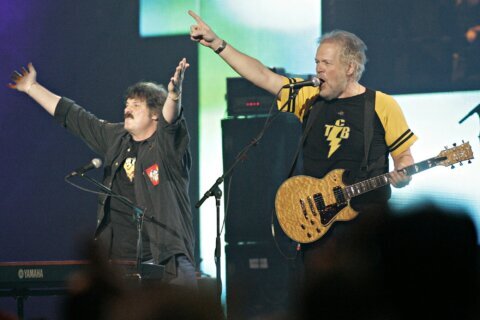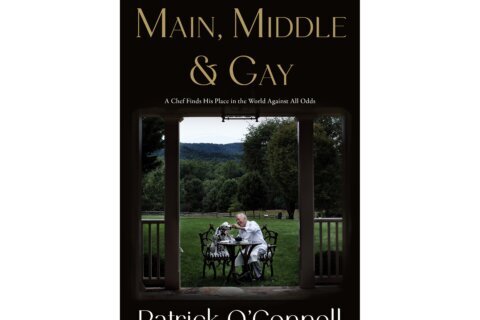WASHINGTON — Long before “winter is coming” there was the “winter of our discontent,” but in this game of thrones, you won’t hear fallen kings begging, “My kingdom for a dragon!”
Shakespeare’s epic play “Richard the Third” hits Shakespeare Theatre now through March 10.
“When you say ‘Richard the Third’ to people who know anything about theater, they know the first line, they know the last line, they know the wooing scene, they know he’s got a hump, all this kind of stuff,” actor Matthew Rauch told WTOP. “But there’s much more to the play than all of that, and I hope we’re undertaking a production that will bring some of that ‘other’ out, rather than just this terrible person who goes and kills a couple of kids — that happens.”
Set after the War of the Roses (1455-1487), the Yorks have defeated the Lancasters thanks to battlefield general Richard III, Duke of Gloucester, whose brother is installed as the new king of England. However, Richard has his own eyes on the throne and plots his rise to power.
“Richard is bored and decides to try to make himself the king of England, even though he is either fifth or sixth in line for the crown and there are all of these people in front of him,” Rauch said. “He decides to do it by any means necessary, and by the end of the play, he has become the king of England, and by the end of the end, he is not alive anymore.”
The themes of strategic chess moves and political power grabs carry across generations.
“The word that kept coming up was ‘complicity,'” Rauch said. “This is a play about a man who will do anything to gain power and who lacks all scruples. It’s also a play about the people around him who assist him, abet him and look the other way while he murders, discards, lies, cheats and steals his way to the throne. It sounds familiar, but the relevance is fairly obvious.”
Its scope makes it one of the most challenging roles in the entire Shakespeare canon.
“It’s a lot of words,” Rauch said. “I think ‘Hamlet’ is the biggest role, but I believe ‘Richard III’ is either second or third in terms of the full text. … When I was a student I had a teacher who used to say, ‘When you’re working on a Shakespeare play or any classic play, imagine that some person in some random town sent you this play and it is a new play. Don’t think of all of the famous people who have done it in all of the famous productions. Don’t think of Olivier or Ian McKellen or Denzel Washington, just imagine that it’s a new play. The play is the map.”
Even so, director David Muse decided to make several important cuts.
“If you got this play in the mail you would think, ‘Really good young writer, needs an editor, but so much potential,” Rauch joked. “We are not doing the full text; that would be nearly four hours long and nobody has patience for that. … Our director has trimmed about 40 percent out. … There’s so many cousins, aunts and uncles in the original play that we’ve combined roles, we’ve eliminated roles, we’ve taken certain scenes out. We hope we don’t offend the Shakespeare purists, but we’ve made a story that is much easier to follow and much clearer.”
In addition to streamlining roles, they have also trimmed superfluous historical nods.
“One of the issues with ‘Richard III’ is it’s an early work, so there’s a lot of things that are clearly a young writer just trying things out,” Rauch said. “It’s also a history play so there’s a lot of references to 15th century British history that a U.S. audience (a) isn’t particularly interested in and (b) doesn’t know anything about. … We’re hoping for something fleet, swift and clear.”
However, the early plays provide the treat of seeing seeds of his future masterpieces.
“There are many elements of the play that you see in a more mature fashion in later plays,” Rauch said. “There’s a very scary moment in ‘Macbeth’ where he realizes he’s gone too far [and] there’s a very similar quote in ‘Richard the Third.’ There’s a monologue toward the end in which Richard recognizes his own villainy, which is in many ways similar to Hamlet’s apotheosis of self-realization in his ‘to be or not to be’ speech. There’s even a scene where a man and woman share language in the way that they share language in ‘Romeo and Juliet.'”
While you’ll notice hints of future plays, ‘Richard III’ is packed with its own iconic moments.
“The first line of the play is: ‘Now is the winter of our discontent made glorious summer by this son of York,'” Rauch said. “People assume it’s a negative, dark line, but it’s actually an optimistic thought that essentially the war is over. The winter has become summer. It’s very important to me that Richard starts in a place of optimism or at least neutrality. If you go out there twisting your mustache at the beginning, you’re playing the end at the beginning.”
After the opening monologue, we sit back and watch to see if his nefarious schemes pan out.
“He lays out where he is at, what he is trying to do and he says, ‘I’ve set all this stuff in motion, I don’t know if it’s going to work or not, let’s see what happens,'” Rauch said. “He lets the audience in on the secret and throughout the first half, he talks to the audience and goes, ‘Oh my god, that worked! Let’s see if I can do this. Oh my god, that worked! This is crazy!’ By the time he becomes king, he basically shuts the audience out until almost the end of the play. It’s a very interesting psychological [device], because at the beginning Richard is running a game.”
It all builds to his climatic comeuppance during the Battle of Bosworth, as Richard is knocked off his horse to deliver the desperate cry: “A horse, a horse, my kingdom for a horse,” which you’ve heard quoted in everything from “The Goodbye Girl” (1977) to “Raging Bull” (1980).
“Richard has become king, he is acting in ways that are increasingly despotic and paranoid, he’s killed many of his allies, many of his perceived enemies, including his wife,” Rauch said. “A rebellion is underway led by Richmond, who has gathered an army attempting to overthrow Richard’s despotic reign. … It turns out to be historically true that he was unhorsed by someone, his helmet was ripped off. … He comes in crying for his horse … and is killed.”
While the anti-hero is ultimately defeated, the play itself ends on an air of hope for England.
“The resistance and hope takes over,” Rouch said. “There is a hopeful message at the end [with] Richmond’s victory. Shakespeare uses that as a way of ushering in the Tudor Monarchy. In our version of the play, it’s positivity and hope overcoming cynicism and paranoia.”
Find more details on the theater website. Hear our full conversation with Matthew Rouch below.








